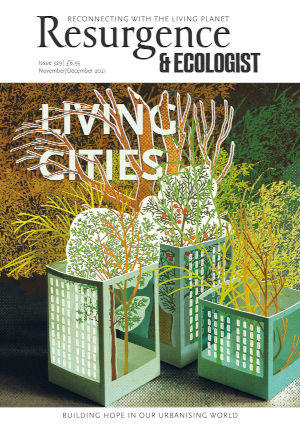“My name is Martin Shaw, and I’m a storyteller… My question is this: how do we as cultures grow our own hands back after an experience like this?” So starts Smoke Hole Sessions, a series of meandering conversations between “actors, philosophers and comedians and visionaries and troublemakers of all kinds” about our recovery from the pandemic. Through a lens of mythic stories and folklore, Shaw wants to turn the “imposition” of coronavirus into an “invitation”.
The result is intriguing. He opens each conversation with a folk tale or myth (minutes worth listening to on their own account), gentle field recordings that cleverly invite the listener to his fireside. Conversations with guests follow: slow, twisting discussions that loop fluently from the literary and philosophical to the personal and often mundane. Some beautiful stories are told: storyteller Jan Blake recalls visiting family in Jamaica for the first time, eating oranges “picked from trees that my grandfather had grown”; actor Mark Rylance dances by a stone circle that may hold a dragon; singer Natasha Khan (Bat for Lashes) steals time with her creativity while her small newborn sleeps. The topics are hermetic, spiritual and personal while staying open and inviting – a real antidote to Twitter-pace conversations.
That said, listeners who are looking for at least a few answers, or breadcrumbs, to what the “invitation” from the “imposition” of coronavirus might be, as Shaw promises in the trailer, may wish to look elsewhere. Shaw is a seasoned conversationalist and doesn’t shy away from tough topics. But somehow the chatter rarely wraps itself around its richer strands, particularly where it comes to environmentalism. In a typical nearly fascinating moment, Rylance muses on “the dark and the light” around his experiences. “I’m sorry”, he interjects, “I fall into gender descriptions. It’s just an old way of describing it.” It’s a profound collision between an environmentalism immersed in folkloric concepts and the emerging tenets of mainstream western activists, and it begs to be explored properly – as is being done in other forums, for example by Zakia Sewell in her magnificent My Albion (Radio 4), or by the Ibeyi sisters. The same feels true throughout the series: discussions only hint at what it means to revisit these mythic stories, these important hermetic and reverential approaches to the natural world, in the context of the true scale of catastrophe and political failure that we have reached.
Maybe this is expecting too explicit, apocalyptic and Twitter-ous an offering from a podcast that is adamantly seeking “responses, not answers”. “Reverie should lead to participation,” Shaw and novelist Jay Griffiths agree in an early episode, but it’s not clear what kind of participation Smoke Hole Sessions is suggesting.







